Key takeaways:
- Performance anxiety is common among artists and tied to self-worth, emphasizing the need for self-compassion.
- Overcoming anxiety enhances creativity and allows for deeper connections with the audience during performances.
- Effective techniques for managing anxiety include visualization, mindful breathing, and extensive preparation.
- Building a supportive environment among bandmates can transform anxiety into a shared experience, fostering deeper connections.
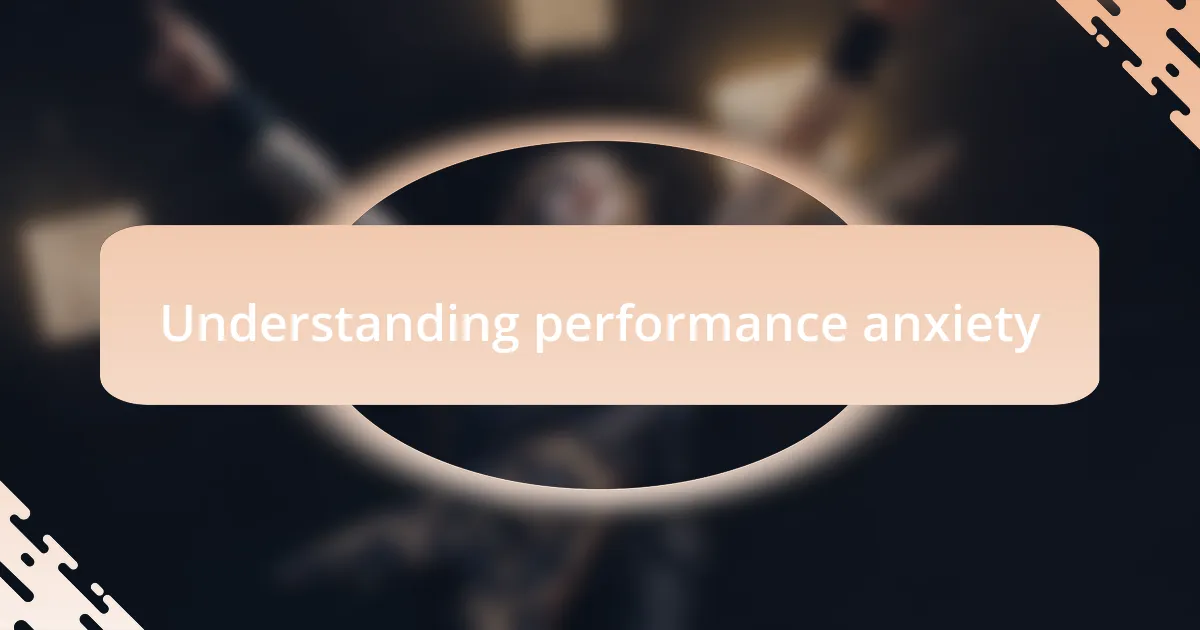
Understanding performance anxiety
Performance anxiety can often feel like a shadow looming over an artist before they step onto a stage. I remember the first time I performed in front of an audience—my hands trembled, and my heart raced as if it were trying to escape my chest. What is it about the thought of being observed that sends waves of dread through us?
This anxiety is not just about fear of failure; it’s tied to our identity as musicians. For instance, I’ve found that when I focus too much on perfection, it can paralyze me. Why do we equate our worth with our performance? It’s crucial to understand that the pressure we place on ourselves can lead to a vicious cycle of self-doubt and fear.
Understanding performance anxiety involves recognizing that it’s a common experience shared by many artists. I once spoke with a fellow musician who admitted that even after years of performing, the butterflies never truly left. How many of us carry that burden, wondering if we’ll ever feel fully at ease on stage? Acknowledging that this anxiety is a normal response can help us navigate those nerves with more compassion and resilience.
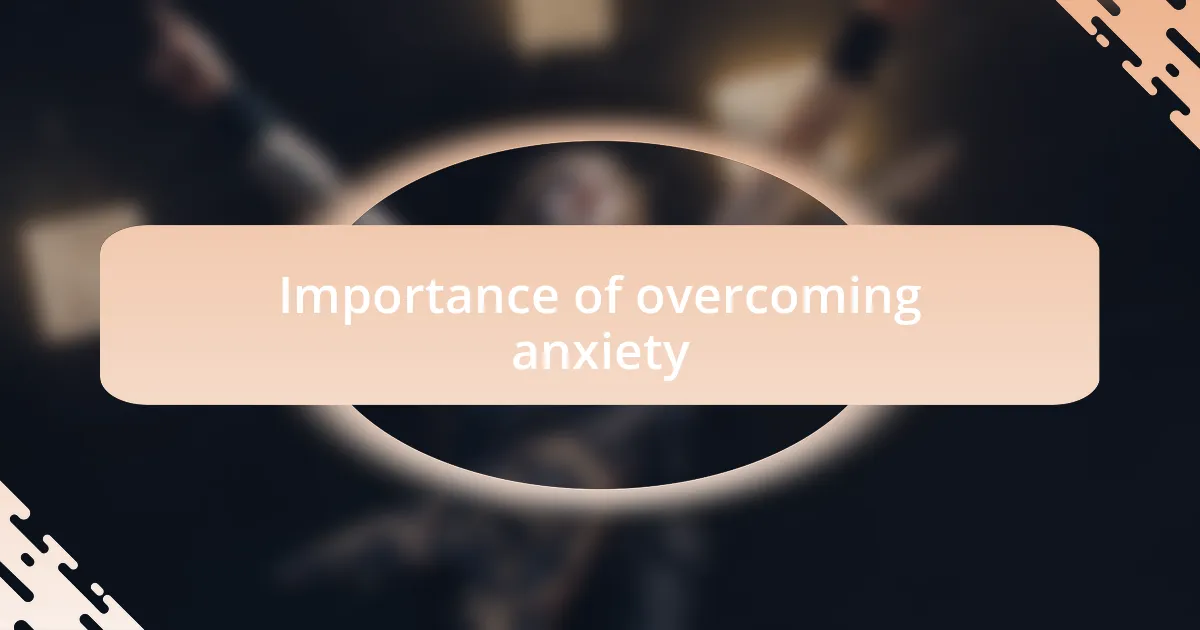
Importance of overcoming anxiety
Overcoming performance anxiety is crucial, as it allows us to fully embrace our passion for music. I vividly recall a moment when I stepped on stage, heart racing, yet the sheer joy of playing washed over me as I let go of my fear. This shift is essential because when we let anxiety dictate our experience, we risk missing out on the exhilaration of performing.
Another important aspect is the potential for creativity to flourish once we conquer our fears. I noticed that during a particularly anxious period, my songwriting suffered; I was too focused on how my music would be perceived. But when I learned to manage my anxiety, I found that I could write freely, allowing authenticity and emotion to flow into my work. Isn’t it fascinating that overcoming this barrier can open doors to greater artistic expression?
Ultimately, the importance of overcoming anxiety extends beyond just our individual experiences; it impacts how we connect with our audience. Each time I perform with confidence, I feel a palpable shift in the energy of the room, as if my relief resonates with the crowd. The sharing of my music becomes an authentic interaction rather than a self-conscious display, enriching both my experience and that of my listeners. How much more fulfilling is it when we can engage with our audience without the weight of anxiety holding us back?
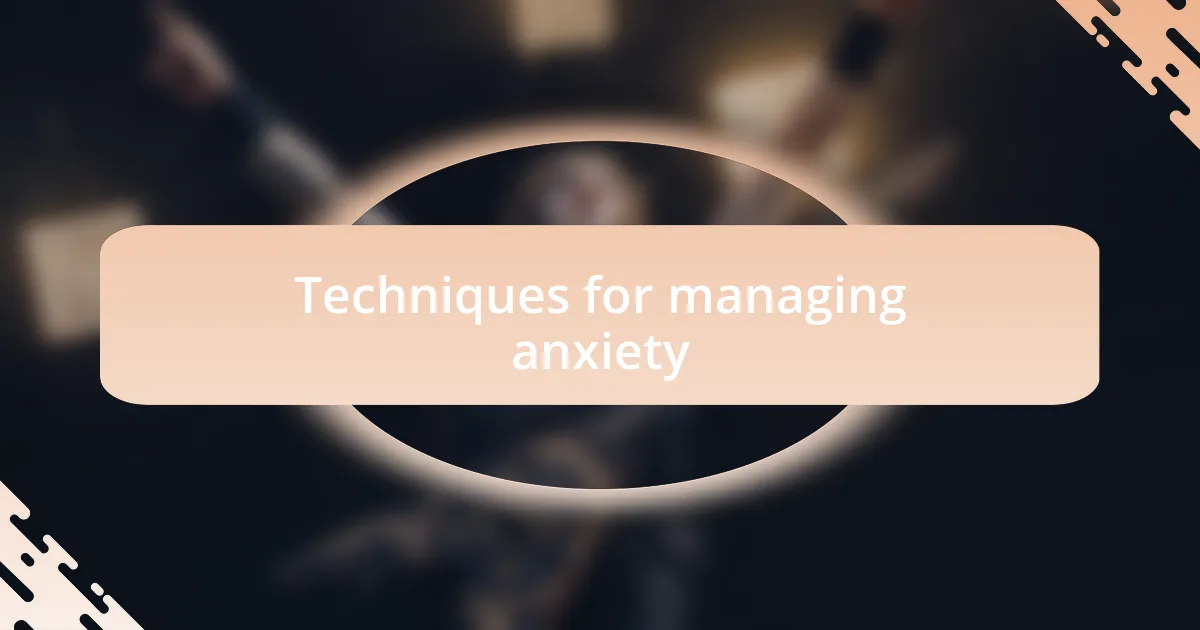
Techniques for managing anxiety
One effective technique for managing performance anxiety is visualization. I often find myself closing my eyes and picturing a successful performance before I step on stage. This mental rehearsal not only calms my nerves but also bolsters my confidence as I see myself engaging passionately with the audience. Have you ever tried this approach?
Another strategy that has worked wonders for me is mindful breathing exercises. Before a show, I take a few moments to focus on my breath, grounding myself in the here and now. This practice shifts my attention away from anxious thoughts and centers me, making the chaos of nerves feel more manageable. It’s incredible how something as simple as breath can bring clarity in moments of uncertainty.
Lastly, I’ve discovered the power of preparing and practicing extensively. The more I rehearse, the more familiar my material becomes, and that familiarity lends itself to confidence. I remember a time when I felt particularly anxious about performing complex guitar solos—I practiced those sections until they felt like second nature. Have you experienced that transformation in your skills as well? Embracing preparation not only eases anxiety but also enhances the authenticity of my performance.
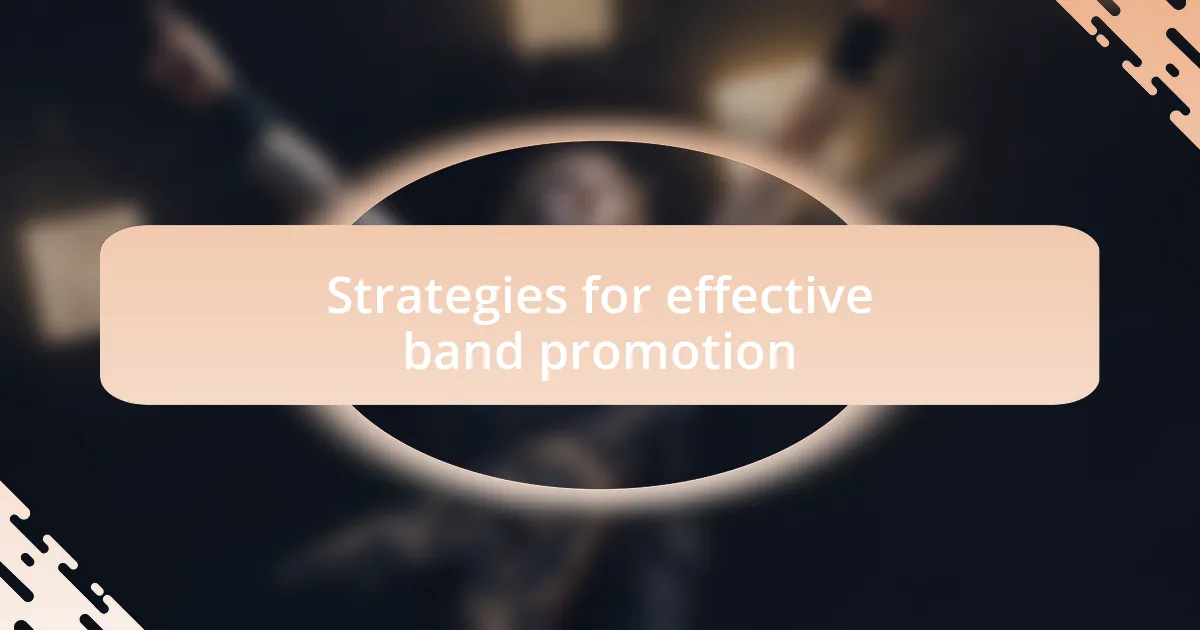
Strategies for effective band promotion
An essential strategy for effective band promotion lies in harnessing social media platforms. I remember the excitement I felt when I first shared a sneak peek of our new song on Instagram; the feedback from fans was immediate and energizing. Engaging with listeners online not only builds a connection but also creates a community that supports your journey. Have you tapped into the power of social media for your band’s visibility?
Another approach that has been incredibly beneficial is collaborating with local influencers or other musicians. I once teamed up with a local artist for a joint gig, which introduced our music to their fan base. This not only expanded our reach but also created a vibrant atmosphere of shared creativity. Have you considered how collaboration could enhance your promotional strategy?
Lastly, I’ve found that live performances can be pivotal. Every gig is an opportunity to showcase your band and attract new fans. I still recall the thrill of playing at a small venue where the audience was fully immersed in our music; those moments often lead to meaningful connections. How do you leverage your live shows for promotion? Discovering the magic of live interaction can truly elevate your band’s profile.
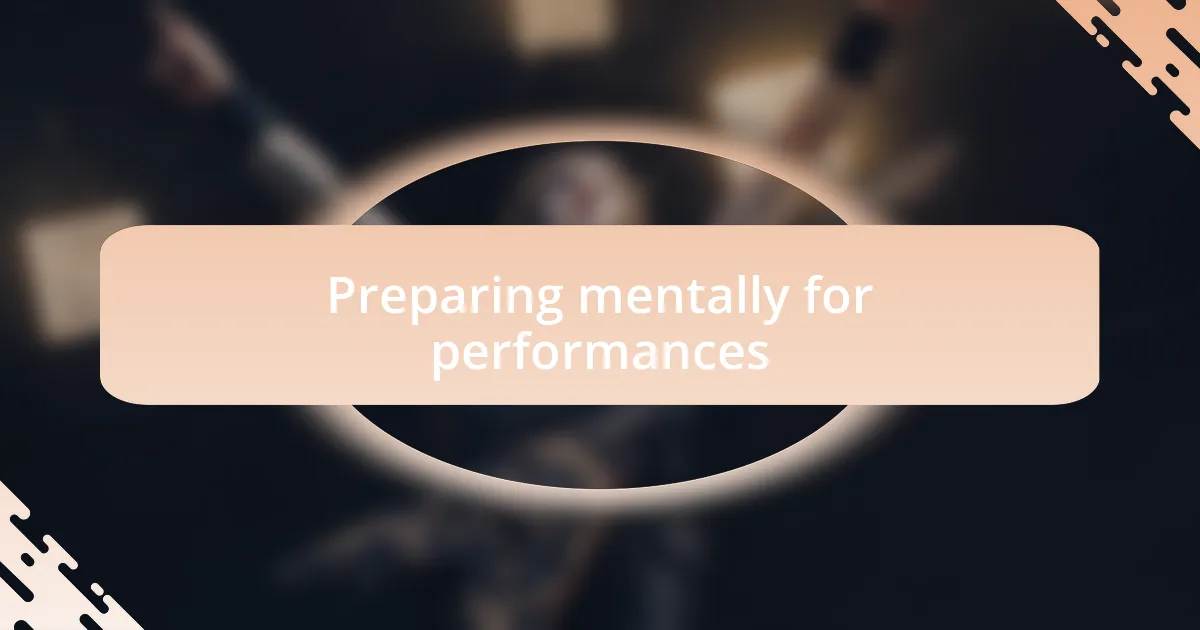
Preparing mentally for performances
When it comes to preparing mentally for performances, visualization plays a crucial role. Before stepping on stage, I often take a moment to close my eyes and picture every detail of the performance—the stage, the audience, and the energy flowing between us. This practice not only boosts my confidence but also helps me feel more in control. Have you tried visualizing your performance? It’s a game-changer.
Another effective strategy I utilize is mindfulness and breath control. Just before a gig, I engage in deep breathing exercises, allowing myself to center my thoughts and calm any jitters. I remember the first time I implemented this; I felt the weight lift off my shoulders and could fully immerse myself in the music. What simple techniques do you have in your mental toolbox to manage anxiety?
Finally, embracing vulnerability can be liberating. I often remind myself that it’s perfectly okay to feel nervous; it’s a sign that I care about my performance. Sharing this sentiment with my bandmates has fostered an environment of support, where we uplift each other in moments of doubt. How do you and your band create a safe space for emotional expression before a show? Understanding that any performance is a shared experience can transform anxiety into excitement.
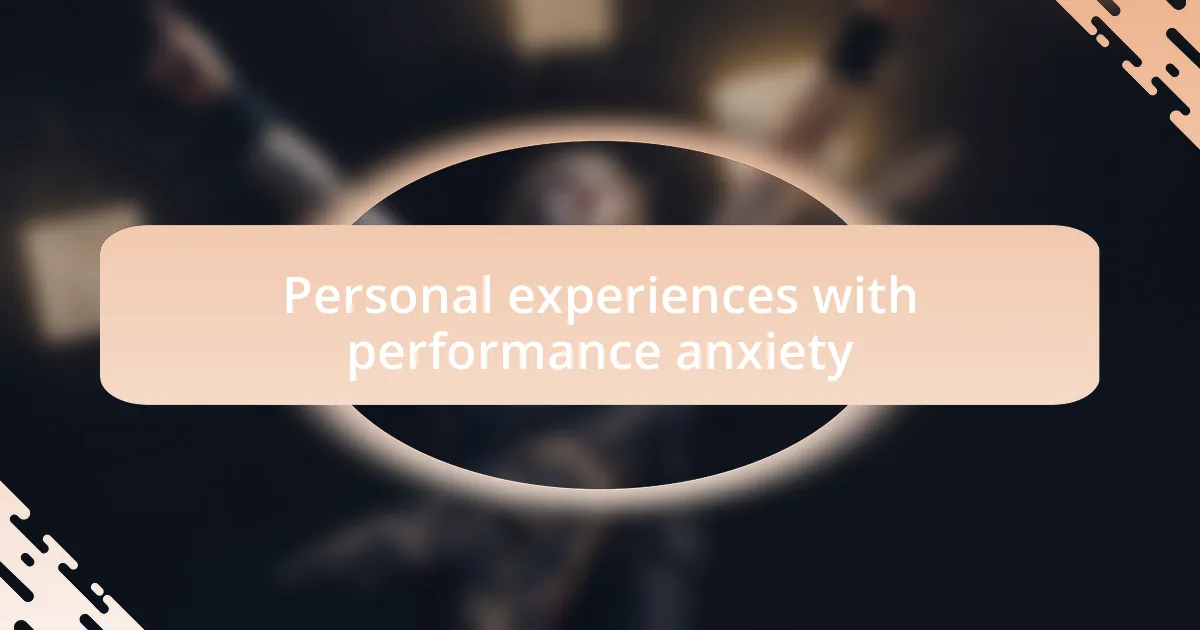
Personal experiences with performance anxiety
There was a time when the mere thought of stepping onto the stage would send my heart racing. I vividly recall my first major show; I stood backstage, my hands trembling and my mind a flurry of “what ifs.” The fear of forgetting my lyrics or being judged by the audience loomed large, but I quickly learned that acknowledging this anxiety transformed it into adrenaline.
During a particularly nerve-wracking performance, I slipped into a moment of silence before my solo, feeling the weight of the spotlight. In that silence, I realized that everyone in the room was rooting for me. That connection brought a wave of reassurance. Have you ever felt that sense of support wash over you, even amidst your anxiety? It changed my perspective completely; I no longer viewed the audience as critics but as allies in a shared experience.
Later, I discovered that talking openly about these feelings with my bandmates helped immensely. One evening, we gathered and shared our own stories of stage fright—laughing over bloopers and recognizing how common this struggle is. That camaraderie made the fear less daunting, turning it into a bonding moment for us. How powerful is it when vulnerability fosters deeper connections within a team? It’s a reminder that we’re all in this together, battling our anxieties side by side.